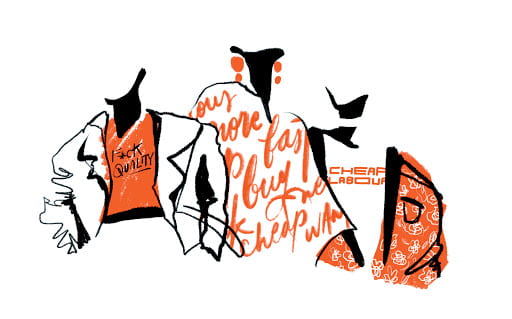The views and opinions expressed in this blog are those of the author and do not necessarily reflect the views of Fashion Et. Cetera.
What if a major fashion retailer had committed to 90 percent of their raw materials being “more sustainable, organic, or recycled” by 2025? Well, Zara has. Their parent company, Inditex, has also pledged to use 80 percent renewable energy across the company. At first glance, that sounds great—a fast fashion giant pledging to move towards sustainability within the next five years—but in truth we shouldn’t be celebrating.
Zara remains one of the leading retailers in an industry that turns out hundreds of new items each week—an industry that is responsible for 20 percent of global waste water, 10 percent of carbon emissions, and the exploitation of roughly 40 million workers globally. When you are producing en masse and with negligible lead times, it doesn’t really matter that you are sourcing organic cotton. Garment factory workers are still living on less than two dollars a day, consumers still throw away clothes after a couple wears, and toxins are still being pumped into our environment.
I would argue that we ought to toss out fast fashion entirely and opt for other alternatives. Don’t get me wrong, reform efforts are a valid and effective method for some systems and industries, but the fast fashion industry is not one of them. When an institution is designed to and continues to serve a purpose that is diametrically opposed to the reform that is being called for, it is time for abolition.
For myself and many others, discourse on abolition and reform has been brought to the forefront this year. While we have been thinking about it in the context of policing and prisons, I think that the recent call for police abolition offers an important parallel to the elimination of fast fashion altogether. I’d like to walk through the origins and current functioning of each institution in order to understand why they are inherently incompatible with the proposed reforms.
Let’s look back at the origins of policing and fast fashion. The advent of policing was driven by concerns about the protection of property and the continuation of the chattel slavery system. The creation of the fast fashion industry was driven by the desire to accumulate wealth in a capitalist society by promoting mass-consumption and throwaway culture while constantly providing new styles to satiate intentionally manufactured consumer need. Since the outset, the means of production have been maximized for economic productivity, which results in short lead times, low wages, significant environmental harm, and complex supply chains.
Both policing and fast fashion are serving the exact purpose for which they were designed— whether it be under the guise of protecting the “common good” or a desire to provide trendy clothes and means of self-expression. It might not be chattel slavery—now it’s the prison-industrial complex—but black and brown people are still disproportionately stripped of rights, forced into labor, and murdered. It might not be fabrics made of carcinogens, but tons of it will still fill landfills, factories will still collapse, all while workers and families continue to die.
How can we expect a system that sees its violence as success to make any lasting or impactful reform? We can’t, and that is why it is time for abolition.
